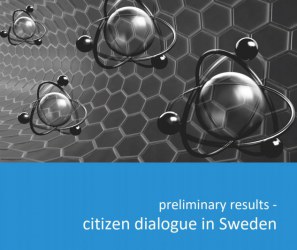On Saturday 22 April the science centre Innovatum, in Trollhättan Sweden, held its first dialogue event about nanotechnology, with focus on nanomedicine.
12 persons, both men and women participated in the event. Innovatum is part of the European project Nano2All which aims to contribute to Responsible Research and Innovation in nanotechnologies. The Dialogue workshop started at 09:00 and continued until lunch around 13.00. The first task in the workshop was for the participants to come up with ideas of future objects related to nanomedicine. They got to design models of their ideas and then they created narratives around their objects in future situations, which they shared with each other and discussed.
From the contents of the narratives needs, concerns and values were listed. After an extra special lunch, the participants got to listen to a lecture given by the researcher Björn Wickman, a doctor in materials science from Chalmers Technical University. The title of the given lecture was ”Nanotechnology – possibilities, trends and risks - from the laboratory to new products.” After the lecture, the participants could have all their questions about nanotechnology answered by Björn. All participants contributed to a successful event during the day. They felt involved in the subject even without previous knowledge to it. During the day, the participants had a fruitful dialogue on how to concretize an idea, to foresee opportunities and to picture a future user. An important part of the workshop was to get new insights, and one participant said ”This technology has infinite possibilities, nano is more than I could ever imagine.” Another one reflected, ”How little I know. Interesting to meet people who are engaged and curious and want to take action in building the future of society” Some subjects that the participants would have liked to further discuss in the dialogue were how nanotechnology would affect economy, business and greed and eventual side effects on health and environment.
Read in the pdf below the preliminary results of this dialogue in the framework of the NANO2ALL project.

